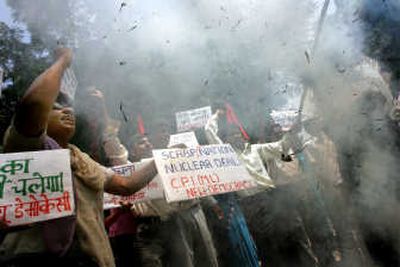U.S.-India nuclear deal teeters

NEW DELHI – After two years of painstaking negotiations, a historic nuclear cooperation agreement between the United States and India appears to be unraveling as a broad spectrum of political parties calls on the government of Prime Minister Manmohan Singh to scrap the deal, saying it limits the country’s sovereignty in energy and foreign policy matters.
The landmark accord that just weeks ago looked like a major foreign policy triumph for this energy-starved subcontinent has become a political liability for India’s fragile ruling coalition.
The brouhaha over the deal has surprised some nuclear analysts in Washington, partly because the Bush administration was widely perceived as having caved in to key Indian demands. The administration had assured the government here that it could receive uninterrupted nuclear supplies from the United States and maintain the right to reprocess spent nuclear fuel – a potentially dangerous prospect because reprocessing technology can also be used to make weapons-grade plutonium. To many Western observers, India already had the upper hand in the deal, a testament to its growing international influence.
“The Indian negotiators were as tough or tougher than anyone that the U.S. has encountered in recent years,” said Philip Zelikow, former counselor to Secretary of State Condoleezza Rice and a key player in the accord. “India won a great deal.”
In return, the Bush administration firmed up a strategic alliance with a country that in many ways is expected to shape the future of Asia. India’s nuclear program serves as a check on Pakistan’s, as well as a counterbalance to China’s nuclear prowess.
But in the latest twist of the saga, an alliance of Indian communist parties has called on Singh’s government to scrap the deal. The parties say India’s sovereignty was compromised by the agreement because it includes a condition that all but requires the government’s cooperation in U.S. foreign policy matters.
Partly at issue for India is whether it can conduct further nuclear tests without violating the terms of its agreement with the United States. The right to do so is fiercely protected by politicians in India.
All week, breaking news about the “government in crisis” has been splashed across the newspapers and broadcast on television, with anxious reports about the looming demise of the U.S.-India nuclear deal and, along with it, Singh’s coalition government.
“The deal is frozen. It is stuck,” a senior Indian government official said on condition of anonymity. “Now only a miracle can retrieve the deal.”